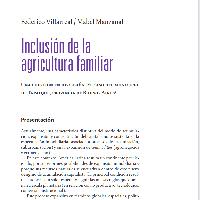Resumen
- La política pública de inclusión de la agricultura familiar aparece enmarcada en el contexto de expansión y promoción del agronegocio, lo cual nos obliga a preguntarnos: ¿es una conquista de derechos que beneficia a las organizaciones y a los actores de la agronomía familiar, o se trata de una política dirigida a incorporar a los sectores desplazados en el discurso dominante, mientras promueve el despojo de sus medios de producción? En este marco, nuestro objetivo es identificar y caracterizar la inclusión de la agricultura familiar a través de la política pública en un ámbito territorial específico de la provincia de Buenos Aires (Tapalqué) entre 2010 y la actualidad, indagar sobre el rol de los agricultores familiares y las políticas locales en torno a la inclusión, y comprender las oportunidades de acción de los actores expuestos a la expulsión y el despojo.
- The public policy (PP) of inclusion of family farming (FF) is framed within the context of expansion and promotion of agribusiness. Which forces us to ask ourselves: what is it then? Are these pp an achievement of rights that benefits the organizations and the actors of the ff? Or is it a pp aimed at incorporating the displaced sectors into the dominant discourse while promoting the dispossession of their means of production by agribusiness? In this context, our objective is to identify and characterize the inclusión of ff through the PP in a specific territorial area of the province of Buenos Aires (Tapalqué) between 2010 and today. For this, we problematize the inclusion and the family farming and in this way we advance in the understanding of the scope of these notions. In Tapalqué, we inquired about the role of family farming and local policies on inclusion. Finally, we have redefined our questions and affirmed that problematizing inclusion, FF and the scope of the pp from the territory favour the analysis and understanding of these processes and enhances the opportunities for action of the actors exposed to expulsion and dispossession.
